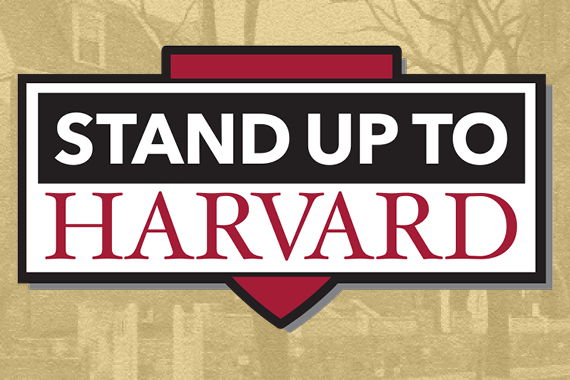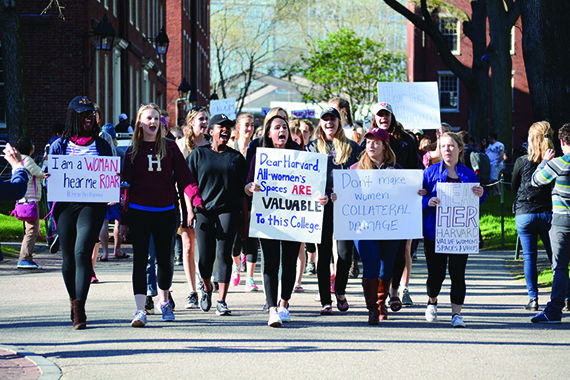Stand Up to Harvard
In December 2018, a group of sororities, fraternities and students filed lawsuits in federal and Massachusetts courts to challenge a Harvard University sanction policy that punishes students who join off-campus, single-sex social organizations. This lawsuit has made headlines in major new outlets and prompted conversation about the need for single-sex organizations and the role institutions should have in a student’s right to associate. There has even been a grassroots social media campaign, called Stand Up to Harvard, designed to bring attention to the issue and the lawsuits.
As a Delta Upsilon brother, you may be asking yourself, “Why should I care?” DU has not had a chapter at Harvard since 2005, and only 106 living DU alumni are from the Harvard Chapter (about 0.1 percent of all living alumni).
If upheld in the courts, Harvard’s policy would set a dangerous precedent that could be followed by other institutions across the United States. As with many areas of academia, Harvard is looked upon within higher education to be a trendsetter and benchmark for success. If Harvard can successfully implement a policy that infringes upon the rights of students, many fear it would be almost inevitable that others follow suit.
For several years now, you have heard Delta Upsilon describe the changing higher education landscape and the threats that exist for the fraternity/sorority community. The reason we share this information with you is that the Fraternity believes it is important for all members to understand the current climate as it affects many of the decisions we make as an organization. Now more than ever before, fraternities and sororities are under the microscope. Bad behavior—behavior antithetical to our beliefs and policies as organizations—is not only heightening media coverage of fraternities and sororities but also bringing about new policies aimed to mitigate risk to students, and in many cases, punish fraternities and sororities. Harvard’s sanctions policy and the outcome of these lawsuits have the capability to completely upend fraternities and sororities. So, while DU is not involved or represented in these suits, the decisions rendered will have a profound impact on our organization and members.
Justice is the foundation of Delta Upsilon. As brothers, it is important for us to understand what is happening at Harvard and fight for justice for the students impacted by the sanctions policy. To take action, you can visit www.standuptoharvard.org to sign a petition showing your support of the litigation or learn how to add your voice to the discussion on social media.
Harvard’s Policy and History
Harvard University has a long history of fraternities as well as finals clubs, which are traditionally all-male social groups to which students could belong. Finals clubs first started to appear at Harvard in 1791, with fraternities joining the campus scene in the mid-1800s. Many of these finals clubs were purely social organizations, while others, over time, would be based in service, literature or the arts. And, like fraternities, several of these finals clubs owned or rented property to serve as gathering spaces.
Fraternities and finals clubs existed as recognized student organizations at Harvard until 1988 when the university announced it would no longer recognize “single-sex institutions” and that groups at Harvard could not be affiliated with national organizations. From this time forward, fraternities and other single-sex finals clubs would operate outside of the university system and self-govern without the support of Harvard. In 1993, the first sorority came to Harvard, Kappa Alpha Theta, which means it and no other sorority at Harvard have ever been a recognized student organization by the university.
Despite cutting ties and recognition from these organizations, Harvard still viewed them as problematic for the Harvard campus culture and as a threat to inclusivity. Harvard also posited that in its view, all-male groups encourage misogynistic behaviors and create problematic environments for women.
So, as a way to prohibit students from joining single-sex organizations, in May 2016, Harvard announced a policy that any student who joined a single-sex social group would face restrictions. These groups include fraternities, sororities, finals clubs, and even all-women’s or all-men’s singing groups. Members of such groups would not be able to hold leadership positions on campus, serve as captains of athletic teams, or receive Harvard's endorsement for postgraduate scholarships like the Rhodes and Marshall. Harvard said sanctions would only be lifted for those groups that decided to go coed.

Explaining the Lawsuits Against Harvard
- In 2016, Harvard announced a sanction policy that would essentially blacklist members of single-sex fraternities, sororities and finals clubs. The policy says that members of these groups cannot hold leadership positions on campus, serve as captains of athletic teams, or receive Harvard's endorsement for postgraduate scholarships like the Rhodes and the Marshall. This policy took effect with the incoming class of 2021.
- Harvard’s fraternities, sororities and finals clubs have not been recognized student organizations since 1988. This means that the groups are private organizations that are not actually connected to the university.
- Two lawsuits, one in federal court and one in the state of Massachusetts, argue that Harvard’s decision interferes with students’ right to associate and be free of sex discrimination, as guaranteed by Title IX and the U.S. Constitution.
- Harvard’s policy unjustly hurts students for joining organizations outside of the university’s purview.
- Since Harvard’s policy announcement, membership in fraternities, sororities and finals clubs have dropped significantly. The four NPC sororities on campus have either closed or withdrawn from their national organizations to become coed.
Policy Implications
Following the policy announcement in 2016, contentious debate ensued. Protests were held, particularly by women’s groups that argued space was needed for women’s only groups and that the policy would hurt women’s organizations that were not part of a cultural problem. Men’s groups also spoke to the need for single-sex organizations, as well as how the policy trampled students’ right to associate, especially since these groups were private organizations not affiliated with the university. Harvard, they argued, had no authority to dictate what groups they could join outside of campus. Both the U.S. Constitution and Title IX law protect the right to associate, with Title IX specifically exempting “the membership practices of a social fraternity or social sorority” from gender discrimination.
Even though the policy was announced in spring 2016, it wasn’t until fall 2018 that Harvard’s governing board voted to approve the policy. However, within that time, damage was done. What was once one in four Harvard students belonging to a fraternity, sorority or single-sex finals club, has significantly decreased. This struggle to recruit new members has had profound ramifications, especially for groups with chapter/club facilities financing those spaces. Today, nearly all women’s groups cease to exist, with most sororities and women’s finals clubs having closed or becoming coed. This includes the four chapters within the National Panhellenic Conference, three of which withdrew from their national organizations to become coed and the other closing. Four men’s finals clubs have also become coed.
The Lawsuits

In December 2018, two lawsuits were filed against Harvard.
In the federal suit, two international sororities, two international fraternities, a Cambridge fraternity chapter, and three current Harvard students assert that through the sanctions policy, the President and Fellows of Harvard College have interfered with students’ right to be free of sex discrimination, as guaranteed by Title IX and the U.S. Constitution.
In the suit filed in Massachusetts court, three women’s organizations—an international sorority, one of its chapters, and a sorority housing corporation—assert that Harvard has interfered with student’s rights to free association and equal treatment based on sex.
“Sororities, fraternities and students sued Harvard today because its sanctions policy is discriminatory and unlawful,” said R. Stanton Jones of Arnold & Porter, a lawyer for the plaintiffs in the federal case, in a press release announcing the lawsuits. “The disregard of students’ basic freedoms and the destruction of the women’s groups is indefensible. Harvard should get out of the business of trying to dictate who students spend their time with off campus.”
The plaintiffs and lawsuits have support from nearly 100 single-sex organizations, including the 26 sororities of the National Panhellenic Conference (NPC), the 66 fraternities of the North American Interfraternity Conference (NIC), and the organizations in the Cambridge Coalition, a nonprofit coalition to advance equity and justice within the Cambridge community. As of March 10, 2019, more than 62,000 people have signed the petition on www.standuptoharvard.org to show their support.
Why the Lawsuits Matter
According to Stand Up to Harvard organizers, “Harvard is interfering with students’ rights protected by the First Amendment, the Fourteenth Amendment, and Title IX—a dangerous precedent by one of America’s bellwether higher education institutions.”
Throughout the past few years, scores of institutions across the country have been placing harsh restrictions on fraternity/sorority life as a means to address campus culture issues, specifically around sexual assault, hazing, and alcohol and substance use. In many cases, these restrictions hurt all chapters, not just those chapters or individuals that violate policies and/or the law. Blanket, system-wide suspensions have been put in place at more than a dozen campuses with DU chapters over the past three years. If Harvard’s policy is upheld by the courts, it would provide another avenue for campuses to stymie membership in Greek Life.
“Delta Upsilon believes in the transformative, positive influence of fraternity membership,” said Delta Upsilon Executive Director Justin Kirk. “We also believe that chapters and individuals that put others at risk by violating policy and law should be held accountable for their actions. However, punishing entire fraternity/sorority communities for the actions of a few is not a solution. Eliminating fraternities and sororities—at Harvard or elsewhere—does not address the root causes of the attitudes and behaviors that lead to misconduct. Because we all value student development, universities and fraternal organizations must work together to provide meaningful, safe spaces for fellowship and personal growth.”
Lawsuits Against Yale
While the lawsuits against Harvard aim to protect association in a single-sex organization, recent lawsuits at Yale University take the opposite approach. Yale does allow single-sex organizations, and in February 2019, three female students sued the university and its nine men’s fraternities for allowing single-sex organizations on campus. The plaintiffs claim women should be admitted into fraternities because single-sex social organizations increase the prevalence of sexual assault, harassment and discrimination on campus.
The outcomes of each of the Harvard and Yale cases have the potential to dramatically affect fraternities and sororities.
